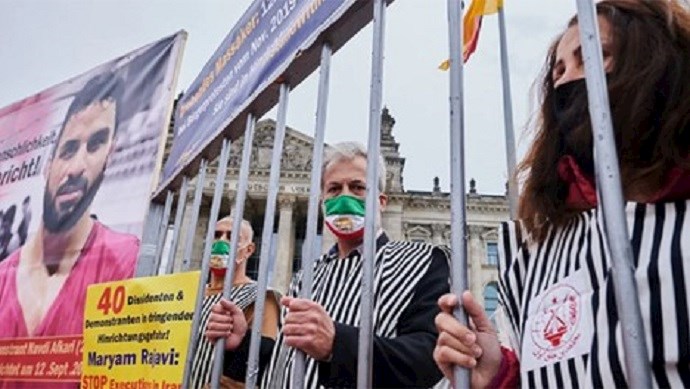Analyzing by PMOI/MEK
Iran, March 26, 2021—The United Nations Human Rights Council adopted a resolution on March 23 extending the mission of Javaid Rehman, the special rapporteur for human rights in Iran, for another year. Rehman was appointed in July of 2018, following the death of former UN special rapporteur Asma Jahangir. In the same session, a resolution was adopted on human rights in Iran with 21 votes in favor, 14 abstentions, and 12 votes against. The resolution urges the regime to cooperate with the UN Special Rapporteur and allow him to visit the country and have access to information to fulfill his mandate.
On Wednesday, March 24, Iranian regime Foreign Ministry spokesperson Saeed Khatibzadeh said the adopted resolution lacks "legitimacy and international consensus.” Khatibzadeh also dismissed the UNHRC resolutions over the past ten years as biased accusations. Khatibzadeh falsely claimed the regime is a “religious democracy that has strived for and feels committed to the promotion of human rights at national, regional, and international levels within the framework of its religious obligations and Constitution!”
This is while in the last 42 years more than 120,000 political executions have taken place and not long ago in November 2019, more than 1,500 protesters were gunned down in the streets by the regime’s suppressive forces.
Previously, on March 9, Javaid Rehman submitted a report to the UNHRC on human rights violations by the clerical regime in Iran. Also, representatives of various governments and non-governmental organizations condemned ongoing human rights violations in Iran. The appointment of a Special Rapporteur among the 193 UN member states covers only 11 major human rights abusers, including the mullahs’ regime in Iran.
Rehman paid special attention to the violation of women’s rights in Iran, while the mullahs’ went the distance to portray their regime as an advocate of women's rights. However, Javaid Rehman's report exposed some of the mullahs’ brutal human rights violations against women, emphasizing that women in Iran rule have no rights and are considered as a second-class citizen.
The regime’s Foreign Ministry spokesperson also attempted to blame sanctions as the main cause preventing the regime from taking care of the people. “The destructive approach adopted by the sponsors of the anti-Iran resolution have numerous shortcomings, including instrumental and political use of human rights, ignoring the values, beliefs and special cultural characteristic of different communities, not paying attention to on-the-ground realities as a result of the influence of media hype and propaganda, and ignoring and remaining silent regarding the flagrant violations of the Iranian nation’s rights under cruel sanctions,” Khatibzadeh said.
Rehman’s report debunks the regime's claim, highlighting that the violation of the Iranian people’s most basic rights is due to the mullahs’ inhumane policies.
Rehman emphasized that for more than a year Tehran has failed to carry out an impartial, independent, and transparent investigation into the use of excessive and lethal force during the November 2019 nationwide protests.
The recent UN resolution has further isolated the Iranian regime at the global stage. The extension of Javaid Rehman’s mandate has the potential of influencing other countries' policies vis-à-vis Iran. The West should question the horrific human rights situation in Iran in their diplomatic relations with the regime.
It is worth mentioning that on September 3 a group of United Nations human rights experts, including Javaid Rehman, demanded clarity on the fate of thousands of Iranian political prisoners executed in 1988, all massacred based on a fatwa (order) issued by then regime supreme leader Ruhollah Khomeini order. Over 30,000 political prisoners, mostly members and supporters of the Iranian opposition People’s Mojahedin Organization of Iran (PMOI/MEK), were sent to the gallows across through the summer of 1988.
Therefore, the extension of Javaid Rehman’s mandate is another reminder that the international community must hold the mullahs accountable for the 1988 massacre and other horrific crimes. As Mrs. Maryam Rajavi, the President-elect of the Iranian opposition coalition National Council of Resistance (NCRI) has repeatedly said, it is time that “the clerical regime’s crimes dossier be referred to the UN Security Council and for its leaders to face justice.”





